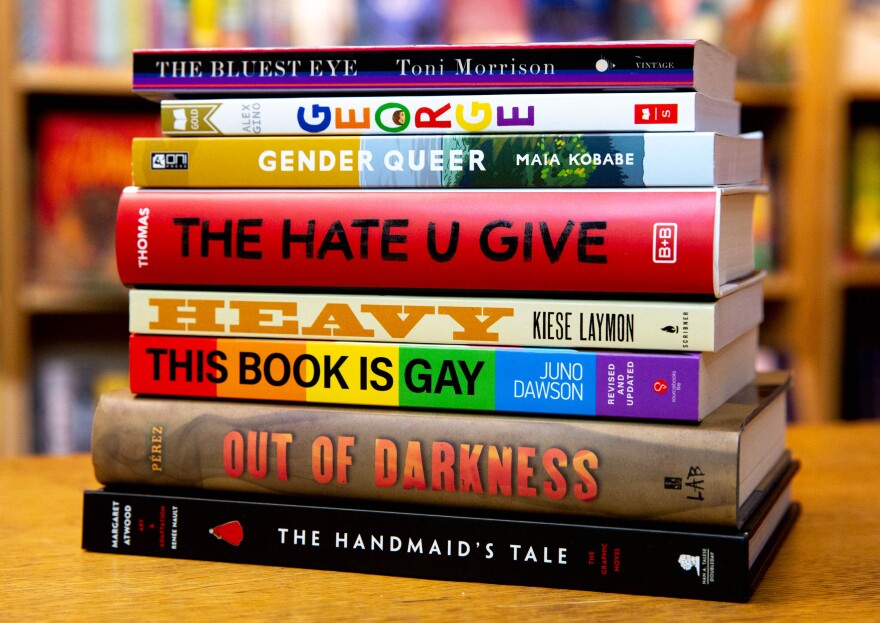Books and Holy Discomfort
Banned Books Week, celebrating the freedom to read, is next week. In Oklahoma and many other states, pulling “offensive” books or books that discomfort students regarding race, religion, ethnicity, gender, sexuality and the like and thus (in Oklahoma) violate the “spirit” of HB 1775, is a thing. A bad thing.
 In honor of Banned Books week, I’ve pulled the following books I’ve read in the last few years from my shelves. Each of these books discomforted me, taught me, challenged me, changed how and to what I pay attention. The common themes are they all include an essentially moral critique: any narrative about Christianity in the U.S. that fails to tell deal with race, white supremacy, and/or money will be a selective, distorted story.
In honor of Banned Books week, I’ve pulled the following books I’ve read in the last few years from my shelves. Each of these books discomforted me, taught me, challenged me, changed how and to what I pay attention. The common themes are they all include an essentially moral critique: any narrative about Christianity in the U.S. that fails to tell deal with race, white supremacy, and/or money will be a selective, distorted story.
In no particular order:
Robin Wall Kimmerer, Braiding Sweetgrass. A beautiful weaving of an indigenous perspective and biological science. I was reminded how difficult it is for me to see myself as belonging to the land and as one of countless organisms sharing the biosphere rather than one to whom land belongs and seeing from outside. Among the many insights: white people don’t act like we’ve put both feet on the land; one foot is still on the boat. Climate change means that the Maple Nation, one of the realms for those wonderful maple-syrup producing trees, will soon be pushed nearly out of the U.S.
Kevin Kruse, One Nation Under God. If you think the linkage between conservative white Christianity and the political right is relatively new, reconsider. Kruse’s book is subtitled “How Corporate America Invented Christian America.” Go back to the capitalist resistance and opposition to FDR’s New Deal to see how tight and long the relationship between a kind of Christianity, capitalism, and conservative politics is.
Roxanne Dunbar Ortiz, An Indigenous People’s History of the United States. Each page is a revelation, and many of those revelations—if it was a revelation for you—is not a happy one. Did you know that tactics the U.S. military learned fighting Western native nations were still used in Vietnam or that scalping was used by the British against the Irish and carried to America by the Brits? America Firsters don’t fare well.
Robert P. Jones, White Too Long. Jones’ narrative is both highly personal and sociologically and data-rich. The links between white evangelical Christianity and racism are not simply correlations. They are causations.
Edward J. Blum, Reforging the White Republic. Among the many factors that brought Reconstruction down was the desire for white Northern clergy to reconcile with their white Southern kinsfolk. Blum’s story theme: each step of the way, white Northern clergy betrayed Black people.
Kelly Brown Douglas, Stand Your Ground. What are the connections between stand your ground laws, the murder of Trayvon Martin, and white supremacy? Plenty. Her telling is theological, moral, and historical.
Ibram X. Kendi, Stamped from the Beginning. Kendi is the villain in nearly any “critical race theory” hatchet job. His massive book represents even more massive research. He compiles and multiples so many examples of language, ideas, practices, policies, laws, and social systems regarding the construction of white supremacy. If a person who identifies as white, and I suspect many other racial-ethnic identities, reads this book and is NOT discomforted by this history, one has not paid attention.
Darren Dochuk, Anointed with Oil. The subtitle is “How Christianity and Crude Made Modern America.” This book was of particular interest to me because I live in oil-famous Oklahoma and know many of the personages and institutions, fundamentalist and evangelical, about whom and which Dochuk writes. I had no idea some of the original extractors believed God put the oil in the ground for their generation to find. I knew of Rockefeller’s largesse toward mainline Christian institutions but not of the ties between oil and Billy Graham or Fuller Seminary.
Heather Cox Richardson, How the South Won the Civil War. Reconstruction is a period of American history that must not have been covered much in my American history classes. To understand what is happening today in the U.S., understanding the failure of Reconstruction, the ascension of the Lost Cause, the fights behind civil rights in the 1950s and 1960s, and the return to that fight today, knowing this history of Reconstruction is essential. I had never thought about Confederate true-believers going to Brazil or out West and trying to reestablish a slave-labor economy. And, of course, one of those destinations was Oklahoma.
All these books are great reads. Each book in its own way discomforted me, caused cognitive dissonance. How else does one learn but through being made uncomfortable?
Dr. Gary Peluso-Verdend is president emeritus at Phillips Theological Seminary and is the executive director of the seminary’s Center for Religion in Public Life. The opinions expressed in this blog are those of the author. Learn more about the Center’s work here and about Gary here.


Comments are closed.